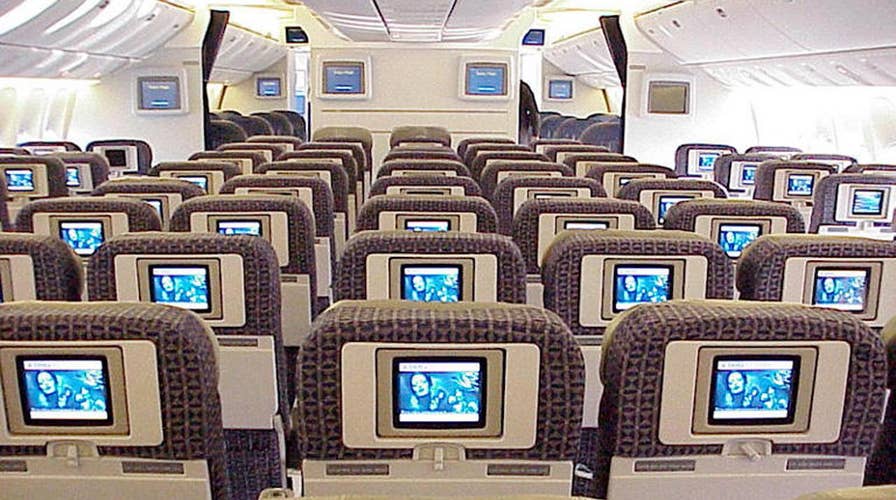What are your rights as an airline passenger?
United policy examined after passenger is forced off flight
Shocking viral videos of security personnel forcibly removing a man from his seat and dragging him down the aisle of a United plane have many wondering what rights passengers have—if any—when they’ve been bumped from a flight.
According to the U.S. Department of Transportation, about one in every 14,000 fliers gets bumped every year, a very, very small number of the more than 631,000,000 passengers who boarded a commercial flight last year. But what happens if you’re asked to leave and you don't want to?
This is what the DOT and major U.S. airlines say about involuntary bumping.
Why do airlines need to bump people from flights?
Airlines routinely overbook flights because they want to make sure that each flight is as full as possible to maximize profits. (United has since admitted that the flight on which the incident occurred was not overbooked but passengers were asked to leave to make room for airline crewmembers who needed to travel to Louisville for work). Carriers expect that a certain percentage of fliers will cancel travel or decide not to show at the last minute for whatever reason and use various formulas to determine "no shows."
UNITED CEO DEFENDS STAFF ACTIONS AFTER SHOCKING VIRAL VIDEO
And the practice of overselling isn’t illegal. According to the DOT, “When an oversale occurs, the Department of Transportation (DOT) requires airlines to ask people who aren't in a hurry to give up their seats voluntarily, in exchange for compensation. Those passengers bumped against their will are, with a few exceptions, entitled to compensation.”
Airlines are required by law to ask for volunteers first. In 2013, the latest year for which this data is available, eight times as many flyers voluntarily gave up their seats than those who were eventually asked to leave during an oversold situation.
How do airlines pick who gets bumped?
This can vary depending on which airline you’re flying and can be found in an airline’s Contract of Carriage, which stipulates the rules and regulations regarding passenger and airline rights. Each carrier has its own policies stipulating who gets bumped first if there aren’t enough volunteers.
According to United’s contract, passengers who receive priority, i.e. those who are least likely to get bumped, include “passengers who are Qualified Individuals with Disabilities, unaccompanied minors under the age of 18 years, or minors between the ages of 5 to 15 years who use the unaccompanied minor service, will be the last to be involuntarily denied boarding if it is determined by UA that such denial would constitute a hardship.”
Southwest, however, takes a more democratic first come, first served approach. According to the Dallas-based carrier’s contact, the last person who boards the plane will likely be the first person taken off a flight in an oversold situation.
After those with priority boarding are assessed, major carriers like United and Delta also look at the price you paid for the ticket, fare class, your full itinerary (if you have several connections and would likely be a pain to rebook, that is taken into consideration) and your frequent flier program status to determine who gets asked to leave next.
So how much you paid for a ticket and whether you're a loyal customer really does make a difference, as stipulated by the airlines.
FOLLOW US ON FACEBOOK FOR MORE FOX LIFESTYLE NEWS
So what happens if I get bumped from a plane?
You are entitled to some form of compensation, commensurate with how long it takes the airline to get to your destination past the scheduled time.
From the DOT, if you arrive at your destination beyond:
--One to two hours after your original landing time on a domestic flight, you'll get 200 percent of the cost of your ticket, up to $675.
--Two or more hours beyond your original landing time on domestic flights gets you 400 percent of the cost of your ticket, up to $1350.
--One to four hours beyond your original landing time on an international itinerary will get you 200 percent of the cost of your ticket, up to $675.
--Four hours or more beyond your original landing time on international flights will net you 400 percent of the cost of your ticket, up to $1350.
--Passengers using frequent flyer award tickets can cash based on the lowest amount paid for the airfare.
Passengers may also request a full refund for the ticket cost, including any additional fees like checked luggage, seat selection or other extras paid during booking travel. If you have to wait until the next day to fly, most airlines will likely put you up in a hotel.
Of course, there's an exception to every rule. According to the DOT, "no compensation is due if the airline arranges substitute transportation which is scheduled to arrive at your destination within one hour of your originally scheduled arrival time."

